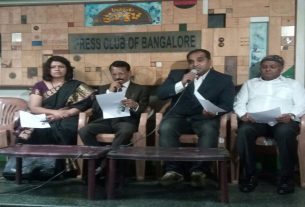Villages in Devadurga lack proper toilets. People say they have to openly defecate and are afraid to use unclean toilets due to the possibility of diseases.
Neglected toilets, layers of dust and mold, no running water, cockroaches everywhere and unpleasant odors permeate the air of Devadurga villages. As do diseases like cholera and diarrhea.
Gopalpur, Yeldoddi, K. Irabagera villages and Yellalinga slum are a few areas in Devadurga taluk that lack proper sanitation facilities.
Kamala, a resident of Yellalinga slum and caretaker of Shishu Palan Kendra, said that there are no washrooms in their houses and they have no choice but to openly defecate. She also said, “I have a six month old baby, it is difficult for me to leave him and go.”
Rajni, a class nine student, from Government Higher Primary School (GHPS), Yeldoddi village said, “I suffer from diarrhea frequently as the school toilet is not cleaned and, there are no proper toilet facilities in my house either.” She also said that her academic performance is decreasing due to her improper health which leads to absenteeism from school.
According to the Swachh Bharat Swachh Vidyalaya scheme, menstrual hygiene management facilities should include dustbins and a trash can, as well as soap, a private changing area, enough water for washing clothes, and a place to dispose of menstrual waste.
Renuka Devi, a teacher from GHPS, Yeldoddi village said that lack of toilets can compromise students’ privacy and dignity, especially in the case of menstruating girls. She also said, “The absence of safe and private sanitation facilities may force girls to miss school during their menstrual cycles, contributing to gender disparities in education.”
She added that discomfort caused by unhygienic toilets can hinder students’ ability to concentrate in class leading to decrease in academic performance and overall educational performance.
Anand Kumar, a practicing doctor from K. Irabagera village, said, “I treat around six patients per week related to water borne and hygiene related diseases such as diarrhea, cholera and typhoid. Patients include children, adults and even elderly.”
He said that lack of toilets lead to people defecating in the open which leads to environmental contamination, as untreated human waste can contaminate water sources, soil and food which adds to the cycle of illness.

A press release from department of drinking water and sanitation, ministry of jal shakti, stated that under Jal Jeevan Mission, more than 5.17 lakh Village Water and Sanitation Committees (VWSCs)/Paani Samitis have been established. Their job is to manage and regulate maintenance of village water supply.
Dr. Shivanand, Chief Medical Officer (CMO) at Taluk government hospital said, “In villages, a 20-30 feet house is attached by a wall to another house and hence there is no space for a drainage system.”
Dr. Banadesh, Taluk Health Officer, Devadurga said that even if the government builds toilets in the villages, some people will not use them because they use toilets as store houses and think of them as taboo. He also said that the people use toilets for storing cattle fodder and other material.
Hanumayya, sarpanch of K. Irabagera village said, “Government officials promise every time that they will construct more toilets and a proper drainage system, but we still have few household toilets and only one community toilet.” He also said that change in political parties and administration impact the continuity of projects.
As per data by Swachh Bharat Mission, Karnataka has in total 36,556 community toilets and Devadurga taluk has only 11.
Shivram Pujari, head of the Yellalinga slum said that they have made many complaints to the government regarding community toilets in the slum but no action has been taken yet. He also said, “In my complaint, I requested the government to consider making investments in better amenities and facilities to ensure that public restrooms in the slum are clean and accessible.”
He added that building and maintaining toilets are a basic necessity and a fundamental aspect of public infrastructure that should not be overlooked.
Dr. Priya T Nandimath from Padmashree School of Public Health said, “In order to avoid severe health issues like Urinary tract Infection (UTI), fungal infections and yeast infection, a hygienic space is essential. Improper toilets can potentially lead to people using open spaces to defecate which is not a better option on many levels.” She also said that women have a higher risk of infection when it comes to using unhygienic toilets.
According to a study, 75 million individuals (81 percent of the slum population) in India has no access to toilets. Out of these, 14 million individuals have no access to any kind of sanitation infrastructure at all.




